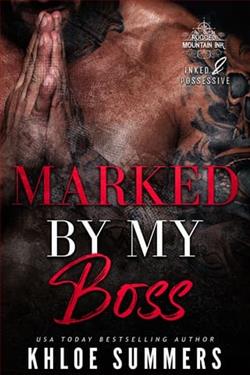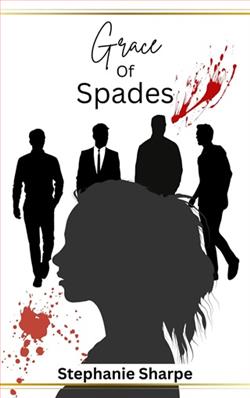Page 19 of Thick and Thin
“Thank you for giving me the time,” he said, looking around the yard. The neighbors across the street had recently repainted their white house, making ours look even more rundown in the process. Years ago, I’d let the shame about our living conditions fall by the wayside, but every once in a while, those feelings rose to the surface.
But that hadn’t been what Mr. Sherwood had been looking at. I followed his eyes from my old car parked on the street to my dad’s truck in the driveway…sitting right next to Sinclair’s Lexus. “When did you get that car?” Mr. Sherwood asked. “Is that yours?”
“No.” I was sure he was already making assumptions, so I said, “Mr. Whittier let me borrow it for the trip down.”
“That seems generous.” Ah…he’d said the word, but it was obvious from his tone that he didn’t think so.
And we were not going to get into a debate about his motivations. So I simply repeated my earlier question. “What is it you need to tell me?”
Sherwood raised his eyebrows but then nodded. “A lot. But let’s start with this,” he said, pulling his phone out of his jacket pocket and, after typing in his passcode and swiping the screen a couple of times, he handed it to me.
It was an article from the online version of the Winchester Tribune, the daily paper that somehow kept chugging along. Under the headline that read WCC’s lab up and running, there was a picture of the first section of the lab—looking exactly as it had before it had been destroyed. Only this time, there were two students in the picture, pretending like there wasn’t someone with a camera there. The students were administering care to their pretend patient, giving the fair citizens of Winchester a glimpse at their modern learning environment.
Below the picture was an article and I knew I’d need to read it before Sherwood would leave. But what was the point? He’d already uncovered the lie Sinclair had told me, and this felt like I was a dog who’d peed on the carpet, only to have her nose rubbed in it. So rather than read word for word, I scanned it. Of course, it reported exactly what Sinclair had already confirmed, that crews had worked day and night to make sure the lab was ready to go by the fall semester start date.
There were a few choice quotes from Dr. Rakhimov as well and it was weird how, even after all this time, I could hear her haughty voice in my head bragging about the feat, taking most of the credit. But I knew it was the Whittiers’ money that had made it happen. She’d just been smart enough to glom onto them, robbing any other departments of the chance to put that money to good use.
Honestly, though, she’d done a lot of good—and now, in retrospect, I could give her credit. After all, that new auditorium she’d had built would be used by the college as a whole…even if she did have first dibs on it.
When I handed the phone back to him, I said, “Okay. Now what?”
“I have…so much to tell you. We’re allies, you and me—and your father. I don’t like what the Whittiers have done here any more than you.”
So much had changed since I’d left. Regardless of my anger with Sinclair, I didn’t associate him with the mining fiasco. The blame for that sat squarely on his father’s shoulders. And that too was the strangest thing. It was very easy for me to reconcile Gus, Constance’s husband thirty years ago, with the cold, cruel man who’d been hell bent on raping and pillaging a hillside he didn’t have to look at regularly. He was, after all, the same man who’d ignored and rejected his wife and left his youngest son to be raised by a nanny because he’d had doubts about his genes.
But it was a little harder to reconcile Gus with the man I’d had dinner with a little over a week ago. I knew he was simply a mellowed version of his former self…but I couldn’t quite hold the anger in my heart as I had.
I knew, though, that it still mattered to my father.
So I simply nodded.
That was all Sherwood needed to continue. “Anna, you don’t know this, but I’d spoken out too. It was after I graduated with my bachelor’s degree and I came back home. I was earning my master’s online—and I’d gotten my foot in the door at WCC. A group of us held demonstrations protesting the mine—and we were told that free speech was good but this wasn’t Kent State or CU-Berkeley.”
Although I had no idea what he was talking about, I nodded.
He continued. “We were told that we could choose to teach our classes—not full loads anyway—or we could have all the free time we wanted to protest. You probably know already that this town is corrupt from the top to the bottom. I hadn’t realized it until then and it was disheartening. I wasn’t allowed free speech if I wanted my job.”
“Why didn’t you just move somewhere else?”
“I could ask the same of your father.” That was fair—but I didn’t plan to have a discussion about it. “If I’d left, I wouldn’t have been able to get these idiots living here to change—but if I stayed, I could influence young minds, help them see the light.”
His words triggered a memory from my time in his class. One day, instead of lecturing about the American Revolution, he’d used the concept as a jumping off point to talk about tyrants and “history’s bullies.” And then he’d used that as an excuse to talk about the French Revolution and lectured us on how it all boiled down to social and economic inequality.
I’d been paying attention, of course, because being bullied due to my father standing up to a rich man had been the reason why my childhood had been less than ideal—but then in that class, Mr. Sherwood had shifted the conversation once again to talk about civil unrest in the sixties, how ordinary citizens have a say. His lecture had gone all over the place, and he’d even talked about tree spiking and ecotage.
Several students slurped it up—but I knew none of this would be on a test. Besides, I’d thought at the time, I wasn’t going to stick around Winchester. I didn’t plan to take up his or my father’s mantle.
At the end of the lecture, though, he’d quite pointedly said, “If any of you wish to discuss this matter further, come see me during office hours.”
I hadn’t thought much about it at the time. After all, Sherwood had many times reminded students of his office hours. He’d made a point of doing that with me specifically more than once.
“And that’s what I’ve done, Anna. I’ve used my position to open the eyes of the youngest Winchester adults, the ones who’ve been brainwashed into thinking that the government of Winchester has their best interests at heart, the ones who have only been drinking the Kool-Aid because it was given to them by their parents. These kids…they haven’t had the opportunity to analyze or to pick anything apart. That is, until me.”
I wanted this conversation to end as quickly as possible, so I wasn’t going to debate him about his merits as a college instructor. I simply said, “Most of my professors tried to instill that idea into us—to not take anything at face value but to question it, to figure out for ourselves if something seemed rational.”
“Exactly.” He sucked in a deep breath, renewing his focus on me. “So why didn’t you ever come to me during office hours?”
“I felt like I understood the concepts you were teaching in class.”















